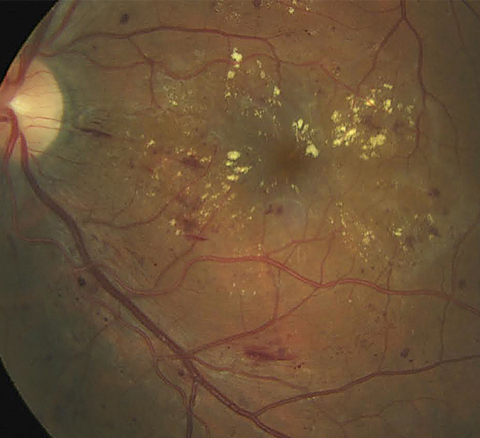 |
|
Patients treated via DEX, a relatively new type of implant for patients with DME, fared significantly better than those treated with anti-VEGF. Click image to enlarge. |
Anti-VEGF agents and corticosteroids are now first-line treatments for diabetic macular edema (DME) with retinal vein occlusion secondary to macular edema (RVO-ME). Researchers recently conducted a meta-analysis to evaluate the safety and efficacy of an extended-release intravitreal corticosteroid implant (DEX) for these conditions. They found that the implant was effective but, as a corticosteroid, carried some risk of cataract and pressure increases.
DEX, approved for DME treatment in 2014, is a “systemic corticosteroid that inhibits inflammation and fibrovascular proliferation,” the researchers explained in their paper. “[It] enhances cell adhesion in the endothelium and retinal pigment epithelium, reduces the release of various damaging chemokines and maintains the integrity of the blood-retinal barrier.”
In the meta-analysis, the researchers identified randomized controlled trials evaluating DEX for DME and RVO-ME and selected 13 studies for inclusion in the analysis. The analysis showed that DEX for RVO-ME was associated with an improvement in best-corrected visual acuity and central retinal thickness. Treatment with DEX for DME showed significantly better central retinal thickness reductions than treatment with anti-VEGF agents. Cataract risk and incidence of high IOP with DEX for RVO-ME and DME were higher than with anti-VEGF.
From these 13 studies, the researchers concluded that DEX “has higher efficacy than anti-VEGF in DME and RVO-ME populations, but the safety profile is inferior to that of anti-VEGF. However, due to the small sample size and obvious clinical heterogeneity of some research results, more multicenter, large-sample randomized studies are needed to reduce or eliminate adverse effects and to explore the best treatment options for complications and improve the safety of drug use so that the clinical use of DEX can benefit more patients.”
Li X, Xie X. The efficacy and safety of dexamethasone intravitreal implant for diabetic macular edema and macular edema secondary to retinal vein occlusion: a meta-analysis of randomized controlled trials. Hindawi J Ophthalmol. 2022;4007002:1-11. |

